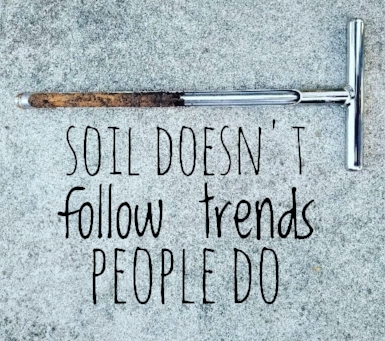Finding Balance
I’ve spent the majority of this week starting to organize our house and get things together in one central location to be cleaned out.
After years of accumulating, collecting, and accepting the well-meaning ‘donations’ from family members I’ve made the decision that I’m over it. If we haven’t used it within the last several months, we never will, and it’s out of here.
All the effort and time spent towards the great clean out and maintaining our regular schedule has not left much time for coming up with a topic let alone writing about it.
However, early this morning, after my husband left for work and I started thinking about what I needed to do today, it dawned on me what I could write…Finding Balance. It’s what I’ve been working towards all week. Finding balance between us and all the stuff we live with.
Everything we do is about finding balance. Everything from health, food, money, relationships, work, kids, how much stuff we have in our homes, and even agronomy is about balance.
I wrote a post several months back titled “Soil Doesn’t Follow Trends.”
https://www.theaccidentalagronomist.com/news/2018/2/15/soil-doesnt-follow-trends-markets-do
The last sentence of the post reads,
“Start paying attention to the soil they (the farmers) have and work with it to apply science and technology in practical ways to harness its natural abilities.”
Finding balance in agronomy is taking the latest in science and technology and applying it practically to meet your soils and plants needs while being sustainable practices you can do. These things do not necessarily mean keeping up with the latest catch-phrases, hashtags, or trends that make their way into agriculture.
One aspect of balance in agronomy is what I do when I start working with a farmer to develop a soil and crop fertility plan. I’m often asked what method or school of thought I use to balance soil nutrients.
I do not prescribe to one philosophy or method for developing a soil fertility plan. I take each farm, farmer, soil type, and crops being grown into consideration. I keep up with what the latest and greatest is and who the current rocks stars are, but just as I feel soil doesn’t follow trends, nor do I.
What I have done is spent years listening to and learning from all different types of agronomists and ag-related professionals from across the industry.
I have several of my favorite resources listed at the following link
https://www.theaccidentalagronomist.com/resources/
Here are a few more that I use frequently-
Ball Redbook Vol 1 Greenhouse & Equipment Vol 2 Crop production
The Ideal Soil v2.0 By Michael Astera
A&L Laboratories Agronomy Handbook
Crop Rotation on Organic Farms edited by Charles L. Mohler & Sue Ellen Johnson

